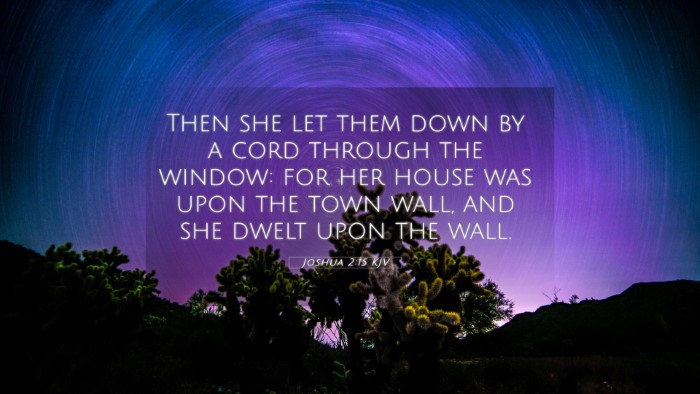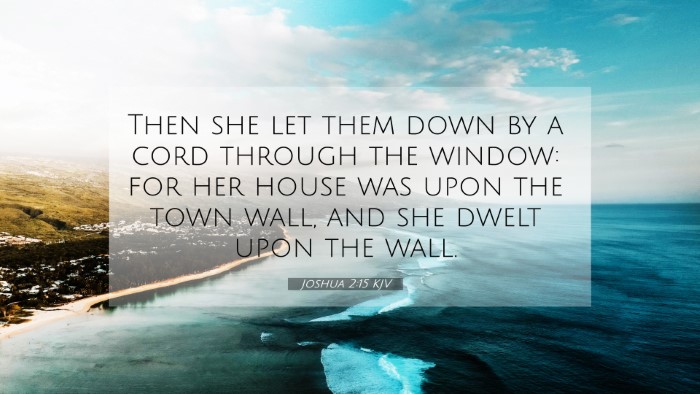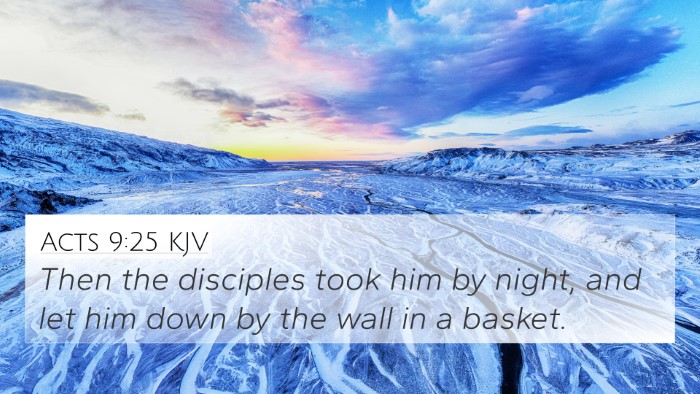Old Testament
Genesis Exodus Leviticus Numbers Deuteronomy Joshua Judges Ruth 1 Samuel 2 Samuel 1 Kings 2 Kings 1 Chronicles 2 Chronicles Ezra Nehemiah Esther Job Psalms Proverbs Ecclesiastes Song of Solomon Isaiah Jeremiah Lamentations Ezekiel Daniel Hosea Joel Amos Obadiah Jonah Micah Nahum Habakkuk Zephaniah Haggai Zechariah MalachiJoshua 2:15 Similar Verses
Joshua 2:15 Cross References
Then she let them down by a cord through the window: for her house was upon the town wall, and she dwelt upon the wall.
Uncover the Rich Themes and Topics of This Bible Verse
Listed below are the Bible themes associated with Joshua 2:15. We invite you to explore each theme to gain deeper insights into the Scriptures.
Joshua 2:15 Cross Reference Verses
This section features a detailed cross-reference designed to enrich your understanding of the Scriptures. Below, you will find carefully selected verses that echo the themes and teachings related to Joshua 2:15 KJV. Click on any image to explore detailed analyses of related Bible verses and uncover deeper theological insights.
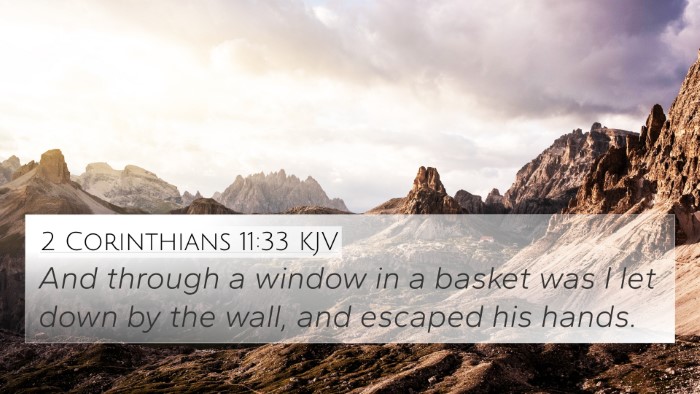
2 Corinthians 11:33 (KJV) »
And through a window in a basket was I let down by the wall, and escaped his hands.

Joshua 6:20 (KJV) »
So the people shouted when the priests blew with the trumpets: and it came to pass, when the people heard the sound of the trumpet, and the people shouted with a great shout, that the wall fell down flat, so that the people went up into the city, every man straight before him, and they took the city.
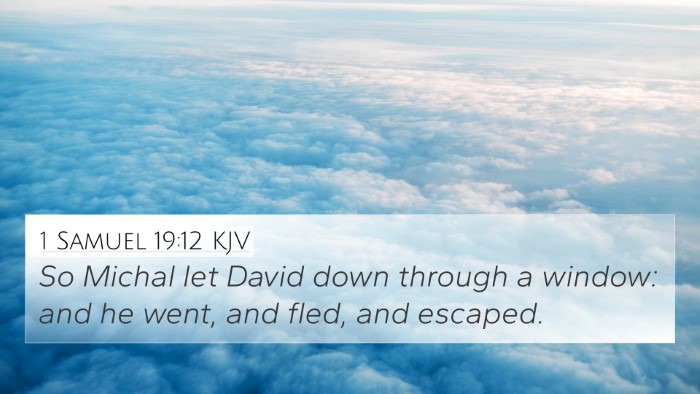
1 Samuel 19:12 (KJV) »
So Michal let David down through a window: and he went, and fled, and escaped.
Joshua 2:15 Verse Analysis and Similar Verses
Understanding Joshua 2:15
Joshua 2:15 presents a critical moment in the narrative of Israel's conquest of Canaan, focusing on the experience of Rahab, the harlot, during the Israelite's espionage mission in Jericho. This verse not only illustrates the themes of faith and redemption but also serves as a bridge connecting Old Testament events with New Testament teachings about faith.
Verse Text
Joshua 2:15 (KJV): "Then she let them down by a cord through the window: for her house was upon the town wall, and she dwelt upon the wall."
Verse Meaning and Interpretation
The significance of Joshua 2:15 can be explored through the insights of notable commentators:
-
Matthew Henry:
Henry emphasizes the courage and resourcefulness of Rahab. By letting the spies down through the window, Rahab not only protects them but also demonstrates her faith in the God of Israel. This act symbolizes her readiness to abandon her former way of life for the sake of becoming part of God's chosen people.
-
Albert Barnes:
Barnes highlights that Rahab's dwelling on the wall represents the precarious position between safety and danger. This physical location mirrors her spiritual state — caught between her past life in Jericho and the potential new life aligned with Israel's God. Her actions depict a pivotal decision that underscores a turning point in her life.
-
Adam Clarke:
Clarke points out the practical implications of the spies being lowered by a cord, symbolizing not only physical escape but also a deeper reliance on divine deliverance. Rahab’s faith leads her to help the spies, and in turn, God rewards her faithfulness by sparing her life and those of her family during the Israelite invasion.
Thematic Connections
The narrative of Joshua 2:15 exemplifies several interconnected themes within the biblical text:
- Faith and Deliverance: Rahab’s act of letting down the spies illustrates the principle of faith leading to deliverance, a theme echoed throughout scripture (Hebrews 11:31).
- Redemption: Rahab, a Canaanite and a prostitute, is redeemed through her faith. This prefigures the New Testament's message of grace available to all (Romans 10:12).
- God’s Sovereignty: The successful espionage indicates God’s control over the unfolding events of Israel’s conquest (Proverbs 21:30).
Cross-References to Joshua 2:15
Several verses connect with Joshua 2:15, enhancing the understanding of Rahab's actions and their significance:
- Hebrews 11:31 - "By faith the harlot Rahab perished not with them that believed not, when she had received the spies with peace." This highlights Rahab's faith as celebrated in the Hall of Faith.
- James 2:25 - "Likewise also was not Rahab the harlot justified by works, when she had received the messengers, and had sent them out another way?" This illustrates the interplay between faith and works.
- Matthew 1:5 - "And Salmon begat Boaz of Rahab; and Boaz begat Obed of Ruth; and Obed begat Jesse." Rahab is directly linked to the lineage of Jesus, showing the redemptive power of God.
- Exodus 12:13 - "And the blood shall be to you for a token upon the houses where ye are: and when I see the blood, I will pass over you, and the plague shall not be upon you to destroy you." This verse resonates with the concept of salvation through protection, similar to Rahab’s household being spared.
- John 3:16 - "For God so loved the world, that he gave his only begotten Son..." This New Testament verse reflects the overarching theme of God’s love and salvation, seen in Rahab’s story.
- Romans 10:13 - "For whosoever shall call upon the name of the Lord shall be saved." This verse parallels the inclusivity of Rahab's faith in the promise of salvation.
- Revelation 21:27 - "And there shall in no wise enter into it any thing that defileth, neither whatsoever worketh abomination, or maketh a lie: but they which are written in the Lamb's book of life." Here, Rahab’s inclusion in God’s people can be seen as a preview of all-inclusive salvation through Christ.
Practical Application
Understanding Joshua 2:15 encourages believers to:
- Recognize that faith can come from unexpected places, as seen in Rahab’s life.
- Understand that God’s grace is available to everyone, regardless of their past.
- Act courageously in faith, trusting in God's deliverance amid challenges.
Conclusion
Joshua 2:15 serves not merely as a historical account but as a profound insight into themes of faith, redemption, and God’s sovereignty. Rahab’s story encourages believers to reflect on their paths of faith, demonstrating that trust in God can lead to miraculous outcomes. The connections established through various Bible verses illustrate a rich tapestry of God’s redemptive plan, knitting together the Old and New Testaments and providing a comprehensive understanding of biblical faith.

